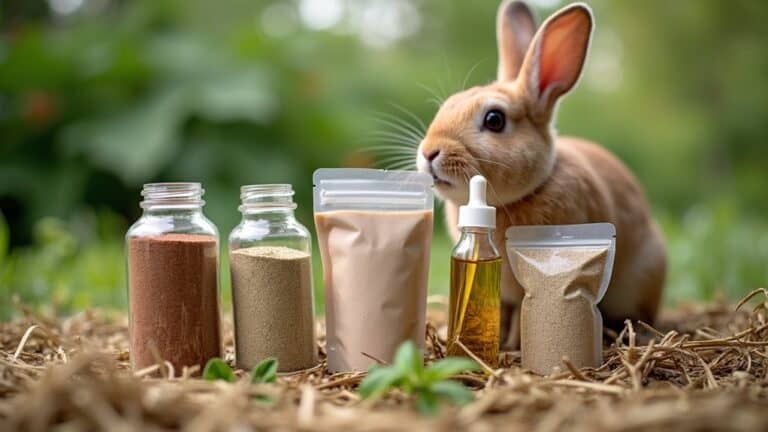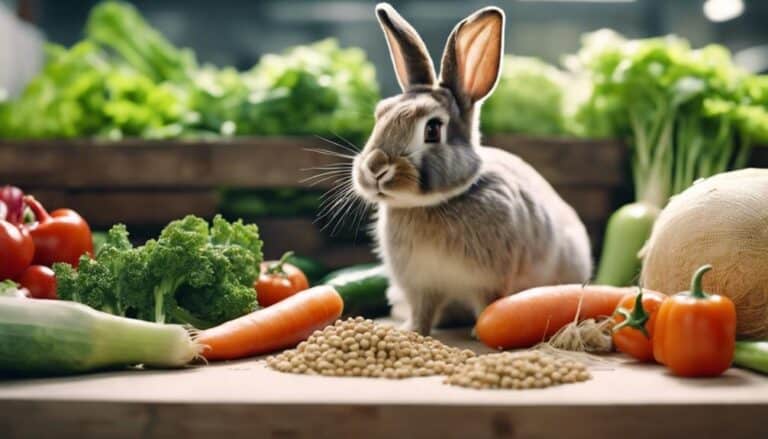You might not realize that a rabbit's diet can importantly impact its mood and behavior. By offering a rainbow of fresh vegetables, you not only enhance their nutritional intake but also keep their interest piqued. However, it's essential to know which vegetables are safe and how to introduce them without upsetting their delicate digestive systems. As you explore the best options for your furry friend, you'll discover the fascinating ways these choices can affect their health and happiness. Curious about which vegetables make the cut?
Contents
- 1 Nutritional Benefits of Colorful Vegetables
- 2 Essential Leafy Greens for Rabbits
- 3 Variety in Rabbit Diets
- 4 Safe and Unsafe Vegetable Choices
- 5 Managing Portion Sizes
- 6 The Role of Hydration
- 7 Seasonal Vegetable Availability
- 8 Observing Rabbit Preferences
- 9 Community Resources for Rabbit Care
- 10 Tips for Introducing New Foods
- 11 Final Thoughts
Nutritional Benefits of Colorful Vegetables
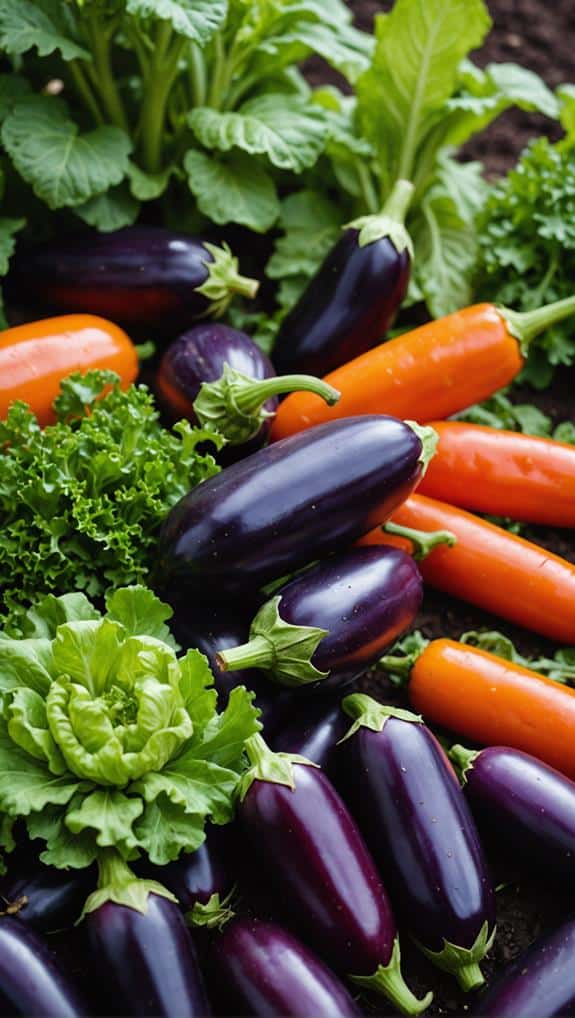
Colorful vegetables are essential for providing fundamental nutrients that support the health of your rabbit. These vibrant foods deliver a wide range of vitamins, minerals, and antioxidants that are crucial for maintaining your rabbit's immune function and overall vitality.
By offering a variety of leafy greens and other colorful vegetables like orange carrots and red bell peppers, you guarantee your pet receives a broad spectrum of nutrients. This diversity promotes healthier skin, fur, and digestion. Incorporating leafy greens into their diet is particularly important for peak health as they're rich in vitamins and minerals.
High-quality vegetables, particularly dark leafy greens, are rich in vitamin C and fiber. These nutrients are imperative for digestive health, helping to prevent gastrointestinal issues that can arise from inadequate nutrition.
Additionally, incorporating a rainbow of vegetables into your rabbit’s diet prevents dietary boredom, encouraging them to maintain a healthy appetite, which is fundamental for their well-being. Moreover, ensuring that your rabbit has a diverse range of vegetables can also contribute to their overall nutritional balance, providing essential vitamins and minerals. However, while experimenting with different greens, it’s crucial to stay informed about rabbits and lupine plant safety, as some plants can be harmful to their health. By prioritizing a varied diet and being mindful of what is safe, you can promote your rabbit’s vitality and happiness.
Feeding your rabbit a diverse array of high-quality vegetables not only enhances their enjoyment of food but also stimulates mental activity, contributing to a happier, more engaged pet.
Prioritizing colorful vegetables in your rabbit's diet can markedly improve their quality of life.
Essential Leafy Greens for Rabbits
Leafy greens are vital for your rabbit's diet, providing essential nutrients that support their overall health.
It's important to choose safe options like romaine lettuce, cilantro, and dandelion greens while avoiding those with high oxalic acid levels.
Additionally, incorporating a variety of leafy greens, such as kale and parsley, can enhance their nutrition further by ensuring they receive adequate fiber and essential nutrients to enhance nutrition.
Nutritional Benefits of Greens
Incorporating a variety of greens into your rabbit's diet is fundamental for their overall health and well-being. Leafy greens provide essential nutrients and vitamins, contributing to a balanced rabbit diet. Aim for a daily intake of 3-4 different types to guarantee maximum nutrition. A diverse selection of greens can enhance your rabbit's diet and help prevent nutrient deficiencies.
Here are four key nutritional benefits of leafy greens:
- Digestive Health: Leafy greens help maintain a healthy digestive system, promoting regularity and preventing gastrointestinal issues.
- Hydration: Fresh greens have high water content, aiding in hydration, which is critical for your rabbit's health.
- Nutrient Absorption: A diverse selection of greens enhances nutrient absorption, allowing your rabbit to gain maximum benefits from their food.
- Mental Stimulation: Varied greens not only provide key nutrients but also encourage mental engagement, making mealtime more enjoyable for your rabbit.
While incorporating these greens, remember to avoid high-oxalic options like kale and spinach, and steer clear of iceberg lettuce due to its low nutritional value.
Safe Leafy Green Options
When selecting the best greens for your rabbit, it's essential to prioritize options that are both nutritious and safe. Leafy greens should comprise a crucial part of your rabbit's diet, with recommendations suggesting about three to four different types daily for balanced nutrition. Nutrient-rich choices include romaine, butter lettuce, cilantro, and fresh herbs like basil and thyme. These greens support digestive health and overall well-being.
However, you should avoid iceberg lettuce entirely, as it offers low nutritional value and may cause digestive issues due to its high toxin levels. Additionally, kale and spinach should be limited; their higher oxalic acid content can be harmful. It's best to verify that kale doesn't exceed one-third of your rabbit's total daily leafy greens intake.
When introducing new leafy greens, do so gradually and always research their safety beforehand. This careful approach helps prevent any potential adverse effects on your rabbit's health.
Variety in Rabbit Diets

How can you guarantee your rabbit enjoys a well-rounded diet? By incorporating a variety of vegetables daily, you make certain they receive essential nutrients while preventing dietary monotony. Aim for three to four different types of vegetables, focusing mainly on leafy greens. Not only does this practice enhance their nutritional intake, but it also promotes mental stimulation.
A balanced diet rich in fresh veggies also supports digestive health and overall well-being, as fresh hay plays a significant role in their nutrition.
Consider these key points when planning your rabbit's meals:
- Leafy Greens: Make these the majority of their vegetable portion. Include options like romaine lettuce, kale, and parsley.
- Herbs: Add herbs like cilantro and basil for added flavor and nutrients.
- Colorful Variety: Introduce different colors and types of vegetables to enhance their diet and engagement.
- Moderation: While most vegetables are safe, limit those high in oxalic acid, like spinach, to avoid health issues.
Regularly including diverse vegetables in your rabbit's diet contributes to improved digestion, energy, and overall happiness.
This variety in rabbit diets is essential for their long-term health, making sure they thrive in your care.
Safe and Unsafe Vegetable Choices
When selecting vegetables for your rabbit, it's important to choose safe options like romaine lettuce and cilantro while avoiding toxic ones such as rhubarb and potato plants.
Moderation is key; for instance, while kale and spinach can be included, they should only make up a small portion of your rabbit's diet due to their higher oxalic acid levels.
Providing a variety of 3-4 different leafy greens daily will help guarantee your rabbit receives a balanced and nutritious diet.
Safe Vegetable Options
A variety of fresh vegetables can be safely included in a rabbit's diet, considerably contributing to their nutritional needs. When choosing leafy greens for your rabbit's daily diet, it's essential to select options that provide essential nutrients while guaranteeing digestive health.
Here are four safe vegetable choices to incorporate:
- Romaine Lettuce: A great source of vitamins and fiber, romaine is a favorite among rabbits.
- Cilantro: Packed with antioxidants, cilantro not only adds flavor but also supports healthy digestion.
- Dandelion Greens: These nutrient-rich greens are excellent for maintaining your rabbit's overall health.
- Basil: This aromatic herb offers vitamins and can be a delightful addition to your rabbit's veggie mix.
Aim to provide a daily offering of 3-4 different types of these safe greens. While it's tempting to add a variety of vegetables, remember to limit high-oxalic greens like kale and spinach, keeping kale to no more than one-third of the total vegetable intake.
Avoid iceberg lettuce and starchy vegetables, as they can lead to digestive issues. Keeping these guidelines in mind will help guarantee your rabbit thrives on a healthy, balanced diet.
Toxic Vegetables to Avoid
While providing safe vegetables is essential for your rabbit's health, it's equally important to be aware of toxic options that can pose serious risks. Certain vegetables should be strictly avoided, as they can lead to severe health issues.
For instance, tomato leaves, rhubarb and its leaves, and potato leaves contain harmful compounds that can be detrimental to your rabbit's well-being. Additionally, starchy vegetables like potatoes disrupt their digestive balance and may cause obesity.
Iceberg lettuce is another toxic vegetable to avoid completely. It has high toxin levels and low nutritional value, which can result in digestive problems for your rabbit.
While leafy greens are generally beneficial, some, like kale and spinach, should be limited due to higher oxalic acid levels. Kale shouldn't exceed one-third of your rabbit's daily veggie intake.
Before introducing any new leafy greens, always research them thoroughly. Familiarizing yourself with what's safe and what's toxic guarantees that your rabbit enjoys a healthy and balanced diet.
Prioritizing your pet's health means steering clear of these toxic vegetables and providing only the best options.
Moderation and Variety Importance
Balancing your rabbit's diet with a variety of safe vegetables is crucial for their health and happiness. To achieve this, remember that moderation and variety go hand in hand. Aim for vegetables to comprise about 10% of your rabbit's daily intake—roughly 2 cups for a 6 lb rabbit.
Here are some safe vegetable choices to include:
- Romaine Lettuce – A great source of fiber and low in calories.
- Cilantro – Packed with vitamins and adds flavor to their diet.
- Dandelion Greens – Rich in calcium and supports digestive health.
- Kale (limited) – High in nutrients but should be given sparingly due to oxalic acid.
Always introduce new vegetables gradually to monitor your rabbit's tolerance and prevent gastrointestinal issues. Avoid harmful foods like iceberg lettuce and starchy vegetables, such as potatoes, which can lead to serious health problems.
Managing Portion Sizes
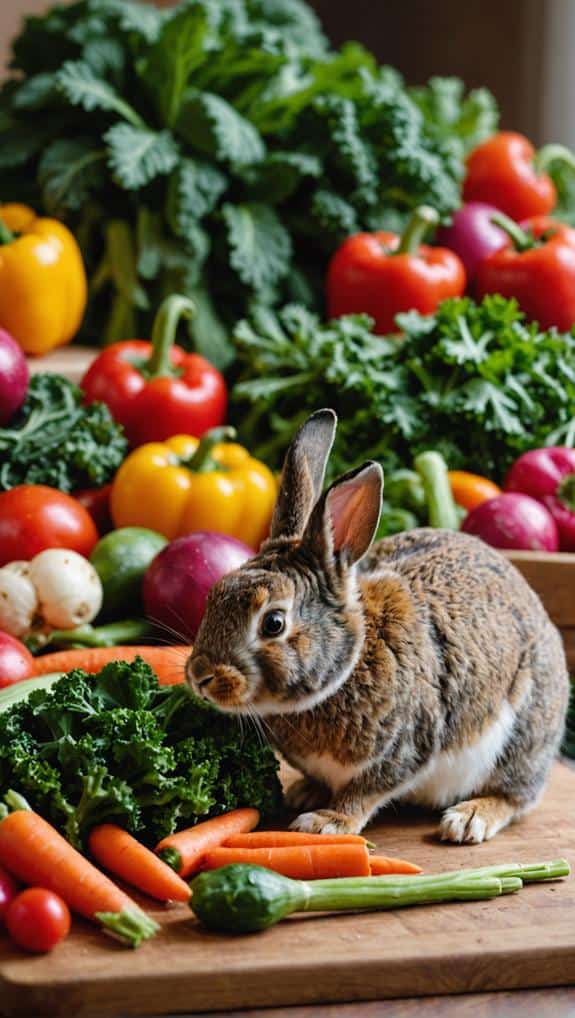
Properly managing portion sizes is essential for your rabbit's health and well-being. For a 6 lb rabbit, aim for about 2 cups of vegetables each day. This guarantees they receive enough nutrients while avoiding digestive issues.
When introducing new vegetables, start with small amounts to monitor your rabbit's tolerance and prevent gastrointestinal upset.
Leafy greens should constitute the bulk of their vegetable intake. Aim to provide 3-4 different types of leafy greens daily to achieve a variety of nutrients and maintain a balanced diet.
However, be cautious with high-oxalic vegetables like kale and spinach—limit these to no more than one-third of the daily vegetable intake to prevent health complications.
It's imperative to avoid starchy vegetables and harmful foods entirely, as their portion sizes should be zero. This approach helps confirm your rabbit stays safe and healthy.
The Role of Hydration
Hydration plays an essential role in your rabbit's overall health and well-being. Since rabbits are composed of approximately 60-70% water, maintaining proper hydration is significant for their digestion and temperature regulation.
While fresh water is important, you can also help keep your rabbit hydrated by offering water-rich vegetables. Here are four key points to reflect on:
- Fresh Water Availability: Always provide clean, fresh water daily, ensuring your rabbit has access at all times.
- Hydration from Vegetables: Incorporate a variety of hydrating vegetables, like cucumbers, celery, and romaine lettuce, into their diet to enhance fluid intake.
- Monitor Hydration Status: Keep an eye out for signs of dehydration, such as lethargy, dry mucous membranes, and decreased urine production.
- Prevent Health Issues: Dehydration can lead to serious conditions, including urinary problems and digestive stasis, so consistent hydration is essential.
Seasonal Vegetable Availability
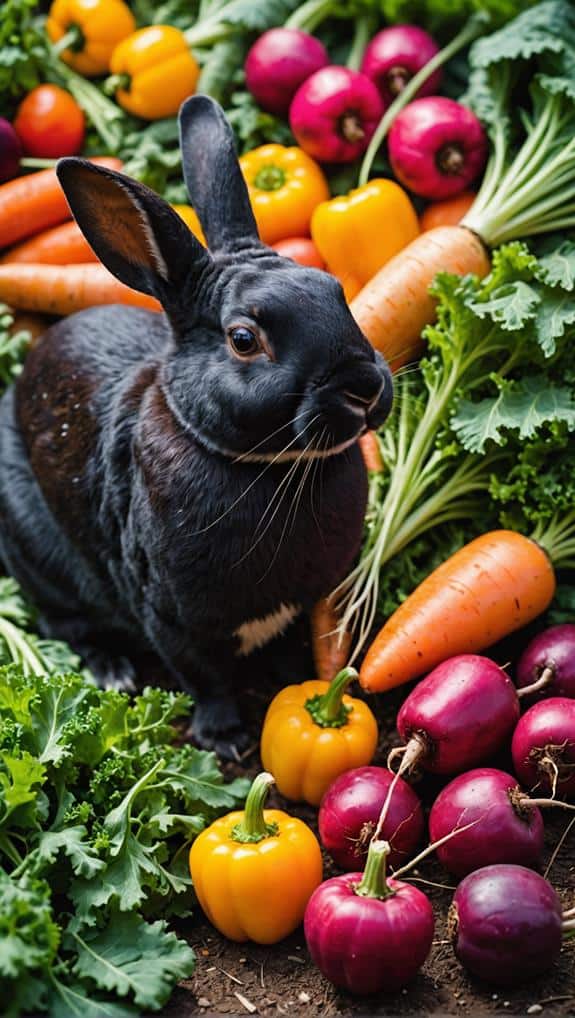
Understanding seasonal vegetable availability is essential for providing a balanced diet for your rabbit.
During spring and summer, you'll find a wide array of fresh greens, while fall brings root vegetables like carrots and beets.
Exploring local sources, such as community gardens or farmers' markets, can help you access these seasonal varieties at a lower cost.
Seasonal Varieties for Rabbits
Incorporating seasonal vegetables into your rabbit's diet is fundamental for maintaining their health and well-being. Seasonal vegetables not only provide a variety of nutrients but also keep your rabbit's diet balanced throughout the year.
During spring and summer, you'll find an abundance of leafy greens that are important for your rabbit's nutrition. In fall, root vegetables become more accessible, offering different nutrients.
Here are four seasonal vegetables to take into account:
- Spring/Summer: Dandelion greens
- Spring/Summer: Romaine lettuce
- Fall: Carrots
- Fall: Turnips
While some vegetables like kale and spinach are available year-round, they should be limited in your rabbit's diet. Instead, focus on incorporating a variety of fresh, seasonal options whenever possible.
Winter may pose challenges in sourcing fresh vegetables, making it significant to stock up on seasonal produce during other months. You might also keep in mind frozen options as a backup.
This approach guarantees your rabbit receives fundamental nutrients while promoting a diverse diet, ultimately contributing to their overall health and happiness.
Local Sourcing Opportunities
Local sourcing opportunities for seasonal vegetables can dramatically enhance your rabbit's diet while supporting sustainable practices. By visiting local farmers' markets, you can access a variety of fresh, seasonal vegetables that are perfect for your rabbit. These markets not only provide high-quality options but also promote local agriculture, benefiting your community.
Consider joining a community-supported agriculture (CSA) program, which delivers seasonal produce directly to your doorstep. This guarantees a steady supply of diverse veggies, enriching your rabbit's diet.
Additionally, gardening initiatives like community gardens or co-ops can connect you with local growers, offering access to organically grown vegetables and potential surplus.
Establishing relationships with local grocery stores or restaurants can yield opportunities to obtain vegetable scraps or excess produce, which can be an economical way to feed your rabbit nutritious options.
Observing Rabbit Preferences
Many rabbit owners find that observing their pet's preferences for specific vegetables can greatly enhance both diet and well-being.
Tailoring a bunny's diet to include their favored veggies not only boosts nutritional variety but also improves their overall happiness.
Here are some key points to reflect on:
- Introduce Gradually: If your rabbit resists new vegetables, don't panic. Gradually introducing new options encourages acceptance and healthier eating habits.
- Diverse Vegetables: Providing a range of different vegetables prevents boredom, which is vital for their mental stimulation.
- Leafy Greens: Many owners report that offering 3-4 types of leafy greens daily enhances their rabbit's energy and mood.
- Track Preferences: Monitoring your rabbit's reactions to various vegetables can guide your future dietary choices, ensuring that their natural diet aligns with their likes and dislikes.
Community Resources for Rabbit Care
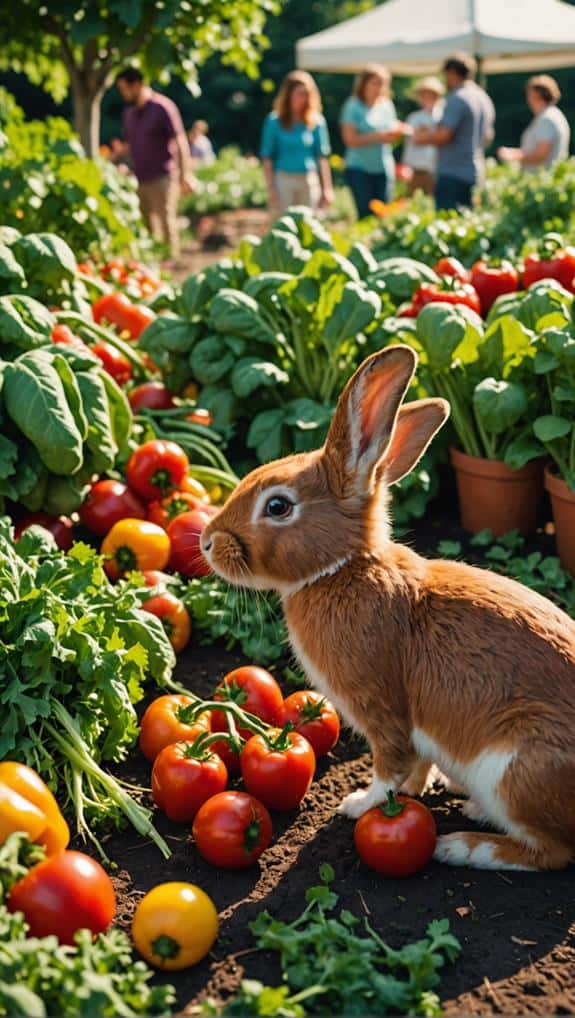
Finding reliable community resources for rabbit care can greatly enhance your pet's well-being and nutrition. As a rabbit owner, tapping into local shelters and rescue groups can provide you with invaluable advice on proper feeding practices.
These organizations often share insights on safe vegetable options and essential care guidelines tailored to your furry friend's needs.
Additionally, online forums and social media groups dedicated to rabbit care serve as excellent platforms for exchanging experiences. Here, you can connect with other rabbit owners to discuss vegetable sourcing and dietary concerns, creating a supportive network focused on improving the health of your pets.
Educational resources from veterinarians and rabbit specialists are also vital. Websites and videos can offer detailed information on the nutritional requirements of rabbits, helping you understand which vegetable varieties to include in their diet.
Consider participating in community gardening initiatives that promote local engagement and sustainability. These projects can provide you with fresh, organic vegetables while fostering a sense of community among fellow rabbit enthusiasts.
Embracing these resources will empower you to make informed choices for your rabbit's nutrition and overall health.
Tips for Introducing New Foods
Introducing new foods to your rabbit's diet is essential for their overall health, but it must be done carefully. To successfully introduce new vegetables, follow these tips for a smooth changeover.
- Start Slow: Introduce new vegetables in a small amount, allowing your rabbit's digestive system to adjust without causing gastrointestinal issues.
- Variety Matters: Offer a mix of leafy greens each day, aiming for about 3-4 different types to guarantee a balanced nutrient intake.
- Monitor Closely: Gradually increase the quantity of new foods over several days. Watch for any signs of digestive upset, such as changes in stool or behavior.
- Timing is Key: Place the new vegetables in the morning to encourage your rabbit to consume hay throughout the day, as fresh veggies can stimulate their appetite.
Before introducing new vegetables, always research their safety to prevent harmful reactions.
Final Thoughts
By feeding your rabbit a dazzling array of fresh, colorful vegetables, you're not just enhancing their diet—you're practically crafting a gourmet feast fit for a king! Imagine their delight as they munch on vibrant greens, bursting with crucial nutrients. This simple act can transform your bunny's health and happiness, ensuring they leap with joy and energy. Remember, a well-balanced, varied diet is the key to a long, healthy life for your furry friend.


